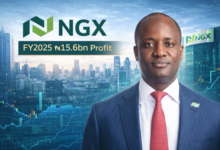SEC Warns of AI-Powered Investment Scams, Unveils Predictive Surveillance System

In a digital economy racing towards automation and machine intelligence, Nigeria’s financial regulators are facing a new and formidable challenge: Artificial Intelligence AI-Generated Investment scams. The Securities and Exchange Commission (SEC), in a Sunday statement, raised alarm over the rising wave of fraud that exploits cutting-edge generative AI tools to produce fake endorsements, deepfake videos, and hyper-targeted social media ads designed to dupe unsuspecting investors.
Unlike traditional Ponzi schemes that thrived on word-of-mouth and WhatsApp chains, these new frauds are more sophisticated, scalable, and psychologically persuasive. They deploy AI to fabricate lifelike videos of celebrities, politicians, and financial influencers endorsing fraudulent platforms, leaving retail investors convinced of legitimacy. SEC’s response has been swift: the regulator has rolled out an advanced, predictive surveillance system capable of detecting fraudulent activities in real-time—a leap from reactive enforcement to proactive oversight.
“This is essential in combating fraud and systemic risks in our market,” SEC declared.
But what does this mean for investors, regulated firms, influencers, and the broader Nigerian financial ecosystem? BRANDECONOMY unpacks the implications.
Anatomy of the AI Scam: How Fraudsters Are Evolving
- Fake Celebrity Endorsements: Scammers deploy AI to create deepfakes of public figures like politicians, Nollywood actors, and international stars appearing to endorse shady platforms.
- AI-Powered Trading Promises: Platforms such as CBEX, Silverkuun, and TOFRO have advertised “AI-powered trading bots” with guaranteed daily profits, a red flag that SEC has repeatedly warned against.
- Social Media Infiltration: Fraudsters now rely heavily on Instagram reels, Telegram groups, and Facebook ads, bypassing traditional awareness campaigns.
- Psychological Targeting: With AI-driven sentiment analysis, scammers fine-tune messages to exploit fear of missing out (FOMO) and the allure of passive income.
This evolution renders conventional fraud-detection methods less effective. The implication? Regulators, investors, and even social media companies must rethink how scams are identified and stopped.
SEC’s Counter-Offensive: Tech-Enabled Oversight
To respond, SEC has activated a multi-pronged surveillance framework:
- Predictive Monitoring: AI-driven analytics now track patterns of suspicious activity across platforms, enabling earlier interventions.
- Social Media Partnerships: SEC is actively working with Facebook, Instagram, and others to flag, remove, and prevent misleading investment ads.
- Influencer Accountability: Bloggers and influencers promoting unlicensed schemes will face sanctions and possible prosecution.
- Cross-Regulatory Collaboration: Partnerships with the Central Bank of Nigeria (CBN) and the Nigerian Financial Intelligence Unit (NFIU) are strengthening, ensuring joint enforcement and intelligence-sharing.
For the first time, SEC is leveraging technology not just to respond, but to anticipate fraudulent activity—moving from a defensive to an offensive posture.
Sector-by-Sector Analysis
1. Retail Investors
Retail investors are the primary targets of AI-powered scams. The emotional pull of celebrity-backed endorsements and promises of “zero-risk daily profits” can lure even cautious savers. With over 60% of Nigerians under 30 and digitally active, SEC’s warnings are both timely and necessary. However, without massive public education campaigns, retail investors will remain vulnerable.
Implication: Investors must adopt a “trust but verify” mindset. Any platform not registered with SEC or promising unrealistic returns should be treated with extreme suspicion.
2. Financial Services Sector
Banks, fintechs, and licensed investment firms stand to benefit from tighter regulations that weed out illegal operators. SEC’s crackdown enhances industry credibility and creates space for legitimate firms to build trust.
Implication: Licensed players must double down on transparency, integrate fraud-awareness education into client outreach, and adopt AI tools for compliance monitoring.
3. Technology & Social Media Platforms
Meta (Facebook, Instagram) and messaging platforms like Telegram are under pressure to cooperate. These channels are the primary vehicles for fraudulent ads and deepfake videos. Stronger collaboration with regulators will shape how quickly such scams are taken down.
Implication: Tech firms must enhance content moderation capacity for AI-generated scams, or risk regulatory fines and reputational backlash.
4. Regulators & Policymakers
The challenge is twofold: protect investors without stifling innovation. Nigeria aspires to be Africa’s fintech hub, and AI is central to that ambition. Overregulation could slow innovation, while underregulation leaves investors exposed.
Implication: Policymakers must balance investor protection with innovation by creating regulatory sandboxes for AI-driven financial solutions while clamping down on unlicensed actors.
5. Influencer Economy
The rise of “finfluencers” has blurred lines between financial advice and marketing. With SEC’s warning, influencers risk sanctions for promoting unlicensed schemes.
Implication: Influencers must adopt compliance frameworks, disclose paid partnerships, and avoid endorsements that could compromise credibility.
Investor Implications: Navigating the New Landscape
- Due Diligence Is Non-Negotiable: Investors must verify every platform through SEC’s official registry before committing funds.
- Diversification as Defence: Overexposure to one high-risk scheme increases vulnerability. Balanced portfolios protect against losses.
- Cybersecurity Awareness: As scams evolve, so should investor literacy. Understanding deepfakes and AI manipulation is crucial.
- Regulated Partnerships: Investors should prioritise firms that operate under SEC or CBN licenses and avoid peer-to-peer schemes promising guaranteed returns.
BRANDECONOMY Takeaways for Decision-Makers
- Investors: If it sounds too good to be true, it almost always is. Treat “guaranteed profit” schemes as scams.
- Regulators: Invest continuously in AI-driven surveillance to stay ahead of fraudsters who are innovating at the same pace as legitimate fintechs.
- Financial Institutions: Use this as an opportunity to position your brand as a safe, transparent, and investor-friendly alternative to unregulated schemes.
- Tech Firms: Collaboration with regulators isn’t optional—it’s existential. Social media credibility depends on stemming the tide of financial fraud.
- Influencers: The age of casual promotions is over. Legal liability for promoting scams is now real and enforceable.
Conclusion
Nigeria’s investment landscape is at a crossroads. The integration of AI into financial markets offers transformative potential for growth, efficiency, and inclusion. Yet the same tools powering innovation are being hijacked by fraudsters.
SEC’s new surveillance strategy signals a pivotal shift—from reactive to predictive regulation. But the fight against AI-driven scams will demand vigilance not just from regulators, but from investors, financial institutions, tech platforms, and the public at large.
In the digital era, investor protection is no longer just about compliance—it’s about education, trust, and technology-enabled vigilance.












